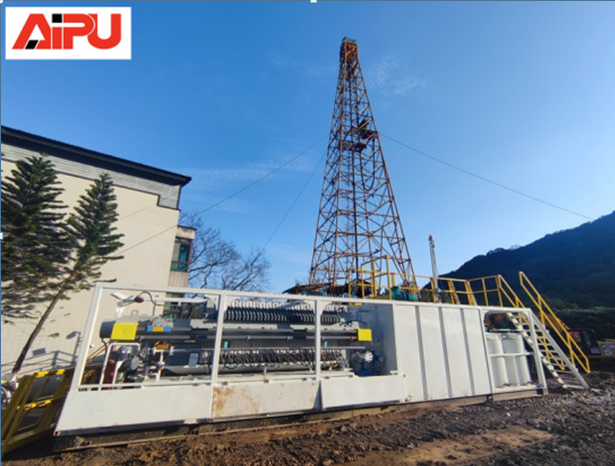Why Quality Equipment Matters in Solids Control
Drilling operations generate a significant amount of waste, which can have a detrimental impact on the environment if not managed properly. Solids control equipment plays a crucial role in minimizing the environmental footprint of drilling activities by effectively separating solids from drilling fluids. This article explores the impact of solids control equipment on drilling waste management.
Enhanced Drilling Fluid Reuse
One of the primary benefits of solids control equipment is its ability to facilitate the reuse of drilling fluids. By removing solid particles from the drilling fluid, the equipment helps maintain the fluid's properties and performance. This allows the drilling fluid to be recycled and reused multiple times, reducing the need for fresh fluid and minimizing waste generation. For example, shale shakers are commonly used to remove large cuttings from the drilling fluid, while hydrocyclones and centrifuges can further separate finer solids. This multi - stage separation process ensures that the drilling fluid remains in a usable condition for longer periods.
Reduction of Waste Volume
Solids control equipment significantly reduces the volume of drilling waste. By separating solids from the drilling fluid, the equipment concentrates the waste into a smaller volume. This not only makes it easier to handle and transport the waste but also reduces the overall disposal costs. For instance, when using a centrifuge, it can separate fine solids from the drilling fluid, leaving behind a relatively dry cake that contains most of the waste solids. The reduced waste volume also means less space is required for waste storage at the drilling site.
Environmental Protection
Proper use of solids control equipment is essential for environmental protection. Drilling waste often contains harmful substances such as heavy metals and hydrocarbons. If this waste is not properly managed, it can contaminate soil, water, and air. Solids control equipment helps remove these contaminants from the drilling fluid, reducing the risk of environmental pollution. By separating solids and treating the drilling fluid, the equipment ensures that the waste disposed of is less harmful to the environment. For example, by removing solids with high - metal content, the potential for soil and water contamination is greatly reduced.
Improved Drilling Efficiency
Solids control equipment can also improve drilling efficiency. When the drilling fluid is free of excessive solids, it can better lubricate the drill bit and carry cuttings to the surface. This reduces wear and tear on the drilling equipment, extends the lifespan of the drill bit, and improves the overall drilling speed. A well - maintained drilling fluid with proper solids control also helps prevent issues such as stuck pipe and lost circulation, which can cause significant delays and additional costs in drilling operations. In this way, solids control equipment not only benefits waste management but also has a positive impact on the economic efficiency of drilling projects.
In conclusion, solids control equipment has a far - reaching impact on drilling waste management. It enhances drilling fluid reuse, reduces waste volume, protects the environment, and improves drilling efficiency. As the demand for more sustainable and cost - effective drilling operations increases, the importance of solids control equipment will continue to grow.

Enhanced Drilling Fluid Reuse
One of the primary benefits of solids control equipment is its ability to facilitate the reuse of drilling fluids. By removing solid particles from the drilling fluid, the equipment helps maintain the fluid's properties and performance. This allows the drilling fluid to be recycled and reused multiple times, reducing the need for fresh fluid and minimizing waste generation. For example, shale shakers are commonly used to remove large cuttings from the drilling fluid, while hydrocyclones and centrifuges can further separate finer solids. This multi - stage separation process ensures that the drilling fluid remains in a usable condition for longer periods.
Reduction of Waste Volume
Solids control equipment significantly reduces the volume of drilling waste. By separating solids from the drilling fluid, the equipment concentrates the waste into a smaller volume. This not only makes it easier to handle and transport the waste but also reduces the overall disposal costs. For instance, when using a centrifuge, it can separate fine solids from the drilling fluid, leaving behind a relatively dry cake that contains most of the waste solids. The reduced waste volume also means less space is required for waste storage at the drilling site.
Environmental Protection
Proper use of solids control equipment is essential for environmental protection. Drilling waste often contains harmful substances such as heavy metals and hydrocarbons. If this waste is not properly managed, it can contaminate soil, water, and air. Solids control equipment helps remove these contaminants from the drilling fluid, reducing the risk of environmental pollution. By separating solids and treating the drilling fluid, the equipment ensures that the waste disposed of is less harmful to the environment. For example, by removing solids with high - metal content, the potential for soil and water contamination is greatly reduced.
Improved Drilling Efficiency
Solids control equipment can also improve drilling efficiency. When the drilling fluid is free of excessive solids, it can better lubricate the drill bit and carry cuttings to the surface. This reduces wear and tear on the drilling equipment, extends the lifespan of the drill bit, and improves the overall drilling speed. A well - maintained drilling fluid with proper solids control also helps prevent issues such as stuck pipe and lost circulation, which can cause significant delays and additional costs in drilling operations. In this way, solids control equipment not only benefits waste management but also has a positive impact on the economic efficiency of drilling projects.
In conclusion, solids control equipment has a far - reaching impact on drilling waste management. It enhances drilling fluid reuse, reduces waste volume, protects the environment, and improves drilling efficiency. As the demand for more sustainable and cost - effective drilling operations increases, the importance of solids control equipment will continue to grow.








